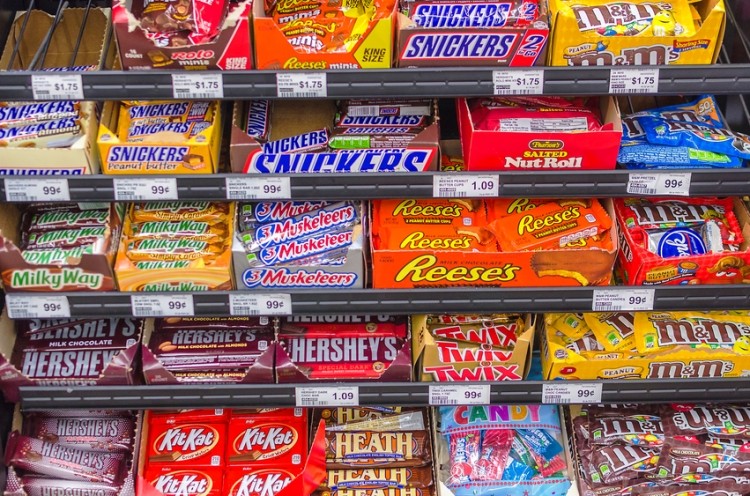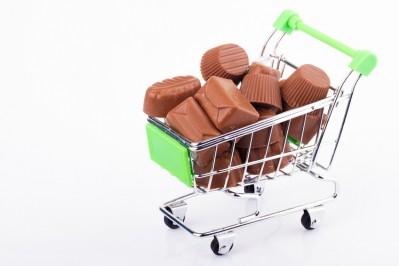A multimillion lost opportunity: Confectioners and snack makers must keep items stocked, says Quri

It has urged manufacturers to regularly refresh displays after finding shelf availability declines for major confectionery and salty snack brands since Memorial Day.
Research by Quri under its 'Summer of Merchandising' program assessed merchandising performance both on and off-shelf for 45 brands in 14 categories at Walmart and Target stores throughout the summer.
It found on-shelf availability (OSA) of confections varied between 93% and 98%, ranking sixth out of 14 categories. It said the OSA of salty snacks ranged from 93% to 99%, ranking fourth.
Hershey chocolate, in particular, saw a big dip at Target directly after Fourth of July, according to Quri. The average OSA for the two weeks leading up to July 4th was 95%, and it dropped to 77% ending on July 24th.
"We don't know the exact reasons for the declines, but I would conjecture that at the start of the season brands start out with large, fully stocked pallet displays," Quri's CEO, Justin Behar, said.
"As they start to sell down, the pallet display then becomes a half pallet, and a quarter pallet, and eventually just an aisle stack," Behar said. "Many times, displays aren't refreshed and begin to diminish as the promotion wears on. If the display sells down too much, it will often get broken down and the remaining product just becomes inventory for stocking the home shelf location."
Two categories could gain $28.3m
A key takeaway from Quri’s study is that there is a tendency to “set and forget” summer displays when in reality those products need to be maintained routinely for incremental sales and share gains.
“Within confections, display presence dropped 32 percentage points (from 60% to 28%) over the course of the summer. Salty Snacks dropped 16 percentage points (from 39% to 23%),” Behar said.
If manufacturers make sure their products are always in stock, confectionery companies could gain $4.1m in sales and salty snack businesses $24.2m, according to Behar.
“This is an approximate number based on 2015 category sales and assumes the opportunity for 16 weeks during the summer,” he explained. “This number is an estimate for all US retailers.”
Confectionery brands through on-shelf and off-shelf merchandising measures in select Walmart and Target stores in US market (10 weeks ending August 1st, 2016)
Display presence (off-shelf measures) | On-shelf availability (on-shelf measures) | |
Hershey's | 52% | 93% |
Jet-puffed | 38% | 97% |
M & M's | 40% | 98% |
Skittles | 17% | 97% |
Salty snack brands through on-shelf and off-shelf merchandising measures in select Walmart and Target stores in US market (10 weeks ending August 1st, 2016)
Display presence (off-shelf measures) | On-shelf availability (on-shelf measures) | |
Cape Cod Brand | 11% | 96% |
Kettle Brand | 3% | 95% |
Nabisco | 46% | 93% |
Tostito's | 45% | 99% |
Source: Quri
Getting displays out of the home aisle
Even though displays are placed in the home aisle 42% of the time, on average, across all categories, Quri finds that displays outside the home aisle are up to three times more effective at driving incremental sales.
What are on-shelf and off-shelf measures?
Off-shelf measures are any measures taken from a location outside of the home shelf location. That includes display presence, display type, display location. On-shelf measures are any measures taken from the home shelf location, which includes on-shelf availability, shelf tag presence, promotional tag presence, and everyday price.
Forty per cent of confectionery brands are displayed in the home aisle, compared to 31% for salty snacks, according to Quri.
“All categories should try to get their displays outside of the home aisle as those displays create more interesting points of disruption and are more effective at driving sales lift,” Behar said.
Aligning on-shelf promotions with off-shelf displays
In addition to monitoring on-shelf availability and display presence, Quri suggests it’s important for manufacturers to look at them together.
“We find there are opportunities in many categories to better align on-shelf promotions with off-shelf displays,” Behar said. “Ensuring promotional activity is reflected both on and off the shelf will ensure the strongest merchandising execution and results.”













